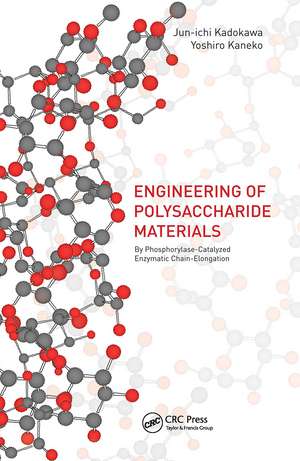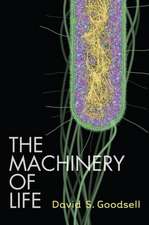Advances in the Engineering of Polysaccharide Materials: by Phosphorylase-Catalyzed Enzymatic Chain-Elongation
Autor Jun-ichi Kadokawa, Yoshiro Kanekoen Limba Engleză Hardback – 17 apr 2013
Preț: 556.52 lei
Preț vechi: 747.56 lei
-26% Nou
Puncte Express: 835
Preț estimativ în valută:
106.49€ • 111.47$ • 88.63£
106.49€ • 111.47$ • 88.63£
Carte tipărită la comandă
Livrare economică 31 martie-14 aprilie
Preluare comenzi: 021 569.72.76
Specificații
ISBN-13: 9789814364454
ISBN-10: 9814364452
Pagini: 142
Ilustrații: 76 b/w images
Dimensiuni: 152 x 229 x 15 mm
Greutate: 0.36 kg
Ediția:1
Editura: Jenny Stanford Publishing
Colecția Jenny Stanford Publishing
ISBN-10: 9814364452
Pagini: 142
Ilustrații: 76 b/w images
Dimensiuni: 152 x 229 x 15 mm
Greutate: 0.36 kg
Ediția:1
Editura: Jenny Stanford Publishing
Colecția Jenny Stanford Publishing
Public țintă
Academic and PostgraduateCuprins
Introduction. General Scope for Enzymatic Tools in Engineering of Polysaccharide Materials. Phosphorylase-catalyzed enzymatic glycosylation. Phosphorylase-catalyzed enzymatic polymerization. Chemoenzymatic synthesis of amylose-grafted synthetic polymeric materials by phosphorylase catalysis. Chemoenzymatic synthesis of amylose-grafting heteropolysaccharide materials by phosphorylase catalysis. Preparation of nanostructured inclusion complexes in phosphorylase-catalyzed enzymatic polymerization ("Vine-twining polymerization"). Applications and material preparations by means of vine-twining polymerization by phosphorylase catalysis. Carbohydrate engineering by phosphorylase catalysis. Preparation of amylose-based nanomaterials by phosphorylase catalysis.
Notă biografică
Jun-ichi Kadokawa is professor at Kagoshima University, Japan, since 2004. He received his PhD from Tohoku University, Japan, in 1992. Then he joined Yamagata University, Japan, as a research associate. From 1996 to 1997, he worked as a visiting scientist at the Max Planck Institute for Polymer Research, Germany. Between 1999 and 2004, he was associate professor at Yamagata University and Tohoku University. Prof. Kadokawa is the recipient of the Award for Encouragement of Research in Polymer Science and the Cellulose Society of Japan Award.
Yoshiro Kaneko received his doctor of engineering degree at Yamagata University in 2001. From 2001 to 2004, he worked as a postdoctoral fellow at Yamagata University and at the National Institute for Materials Science. From 2004 to 2010, he was an assistant professor at Kagoshima University. He has been working as an associate professor at Kagoshima University since 2010.
Yoshiro Kaneko received his doctor of engineering degree at Yamagata University in 2001. From 2001 to 2004, he worked as a postdoctoral fellow at Yamagata University and at the National Institute for Materials Science. From 2004 to 2010, he was an assistant professor at Kagoshima University. He has been working as an associate professor at Kagoshima University since 2010.
Recenzii
"This book covers a wide range of knowledge from the authors’ vast experience in the enzymatic synthesis of polysaccharides. The authors treat with authority subjects such as vine-twining polymerization and amylose-based nanomaterials, which are certain to catch the imagination of polymer chemists of all ages. The text will serve as a useful reference for years to come."
—Prof. Shin-ichiro Shoda, Tohoku University, Sendai, Japan
"Saccharide synthesis has been one of the most difficult processes in terms of the stereo- and regio-selectivity control due to the complicated structure, and actually polysaccharides were not successfully synthesized. The in vitro synthesis of saccharides in the past two decades, however, was made possible by employing enzymes as the catalyst. Hydrolases and phosphorylases are typical enzymes. This book focuses on phosphorylase-catalyzed chain elongation via glycosylation to produce poly- and oligo-saccharides having amylose chains. With these methods, it is now possible to readily prepare various new functional polysaccharide materials."
—Prof. Shiro Kobayashi, Kyoto Institute of Technology, Japan
—Prof. Shin-ichiro Shoda, Tohoku University, Sendai, Japan
"Saccharide synthesis has been one of the most difficult processes in terms of the stereo- and regio-selectivity control due to the complicated structure, and actually polysaccharides were not successfully synthesized. The in vitro synthesis of saccharides in the past two decades, however, was made possible by employing enzymes as the catalyst. Hydrolases and phosphorylases are typical enzymes. This book focuses on phosphorylase-catalyzed chain elongation via glycosylation to produce poly- and oligo-saccharides having amylose chains. With these methods, it is now possible to readily prepare various new functional polysaccharide materials."
—Prof. Shiro Kobayashi, Kyoto Institute of Technology, Japan
Descriere
Polysaccharides and their related compounds are attracting much attention due to their potential as new functional materials in many research fields such as medicine, pharmaceutics, foods, and cosmetics. Therefore, precision synthesis of new polysaccharides with well-defined structure is increasingly important. For this purpose, enzymatic method is a very powerful tool because the reaction proceeds in a manner that is highly stereo- and region-controlled. This book focuses on advances in the practical synthesis of polysaccharides by phosphorylase-catalyzed chain-elongation from the perspective of polysaccharide engineering.










